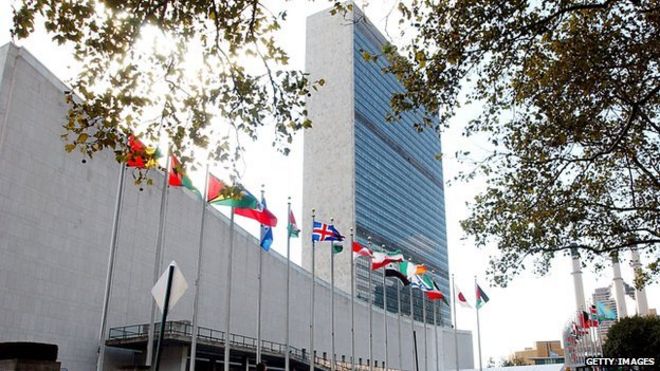Saudi Prince Slams Putin for Arming Assad and Fueling Conflict in the Middle East
By
Liz Fields
March 30, 2015 | 5:30 pm
Saudi Arabia's foreign minister has accused Russian President Vladimir Putin of hypocrisy and fanning tensions in the Middle East by arming Syrian President Bashar al-Assad's regime and contributing to "the tragedies befalling the Syrian people."
Prince Saud al-Faisal made the comments at the Arab League conference in Egypt over the weekend, where representatives from the organization's 22 member states gathered to discuss pressing regional security issues, including conflicts in Syria, Libya, and Iraq. The sharp criticism came in response to a letter Putin sent to summit leaders expressing his continued support for the Middle East.
In the letter, read aloud to participants at the closing session of the 26th Arab League summit, Putin wrote that Russia backs, "the Arabs' aspirations for a prosperous future and for the resolution of all the problems the Arab world faces through peaceful means, without any external interference."
Shortly after the letter was read, al-Faisal rejected the sentiments, saying, "He speaks about the problems in the Middle East as though Russia is not influencing these problems."
Related:
Arab leaders agree to create joint military force to counter 'unprecedented unrest'
"They speak about tragedies in Syria while they are an essential part of the tragedies befalling the Syrian people, by arming the Syrian regime above and beyond what it needs to fight its own people," he added.
The Saudis are among a number of Arab and Western governments that oppose Assad's regime and Russia's continued military support of the Syrian leader, who has been
accusedof using chemical weapons and barrel bombs on civilians.
Moscow and Damascus enjoy a historically strong political and economic relationship, with Russia acting as a diplomatic protector for Syria in many matters raised at United Nations Security Council meetings, including Syria's reported human rights abuses.
'They speak about tragedies in Syria while they are an essential part of the tragedies befalling the Syrian people.'
Moscow has routinely used its veto power on the Security Council to intervene against sanctions on the Assad regime, and is the primary weapons supplier to Damascus. Russia, however, has previously claimed that all arms deals were made prior to 2011, when rebel groups began their campaign to topple Assad. The Syrian conflict has left an estimated 220,000 dead and displaced millions.
Russian Foreign Minister Sergey Lavrov
reportedly defended the country's alliance with Assad at the third round of strategic talks between Russia and the Gulf Cooperation Council. Lavrov said Moscow's continued support is important as Syria battles "external" challenges, presumably including those created by the Islamic State and other militant groups.
"Sometimes we hear calls for ending military-technical cooperation with Syria," Lavrov said,
according to the Russia and India Report, a site financed by
Rossiyskaya Gazeta, the Russian government's official newspaper. "I would like to recall that from the very outset it was aimed at enhancing Syria's defense in the face of an external threat, and not at supporting Bashar Assad or whoever. That cooperation does not run counter to any international commitments."
But in an interview published Monday by
Rossiyskaya Gazeta, Assad contradicted the Kremlin's official line, revealing multiple arms contracts his government signed with Russia both before and after the conflict began.
Related:
UN Security Council condemns chlorine weapons in Syria, but doesn't blame Assad.
"There are contracts that had been sealed before the crisis started and were carried out during the crisis," Assad told the paper. "There are other agreements on arms supplies and cooperation that were signed during the crisis and are being carried out now."
While many governments had already suspected this was the case, Mark N. Katz, a professor of government and politics at George Mason University, told VICE News that Assad's comments are surprising and show that "there is some tension in the relationship" with Russia.
"It's amazing is that Assad has seen fit to contradict Moscow on this," Katz said. "It demonstrates they're not completely on the same page."
Katz, the author of
Russia and Arabia: Soviet Foreign Policy toward the Arabian Peninsula,added that the Syrian leader's remarks could be seen as an attempt to sandbag three days of upcoming talks between Assad envoys and moderate Syrian opposition figures that Russia will host starting April 6.
"It's almost as if Assad is trying to undercut the talks that are coming up," Katz said. "That he's trying to convey to Russia and whomever these opposition figures are, that he's not making any serious concessions."
Moscow did not deny Assad's claims Monday, but rather affirmed its position that no military or legal limitations exist in the Syrian-Russian relationship.
"Moscow has always highlighted that there have been and are no embargoes on military cooperation," Kremlin spokesman Dmitry Peskov told reporters. "There are no legal limitations on us."
Peskov also skirted questions about the al-Faisal's criticism of Putin at the Arab League conference.
"The commentary was made by the [Saudi] foreign minister, so I believe that it would be appropriate for our Foreign Ministry to offer an opinion," Peskov said.
Related:
The EU and NATO are gearing up to fight Russia — on the internet.
Despite the steady flow of arms from Russia to the Syrian government, some experts say Putin has no intentions of providing ground support to Assad, unless perhaps it becomes clear that the rebels are coming close to toppling the regime.
Stephen Sestanovich, a former US State Department ambassador and advisor responsible for US policy toward the states of the former Soviet Union,
said previously that Putin is "very likely to resupply Syria, very unlikely to put Russian military personnel in harm's way."
"Yes, he wants Assad to survive," said Sestanovich, currently a senior fellow for Russian and Eurasian studies at the Council on Foreign Relations. "No, he does not intend to go down in flames with him."
https://news.vice.com/article/saudi...lict-in-the-middle-east?utm_source=vicenewsfb



 you couldn't make this up
you couldn't make this up













